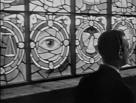
The essential nature of film is expressed through the act of gazing. Great films demand a fixed attention; the real strength of that contraption, the motion picture projector, is to generate the illusion that pictures move. Movies, though, are not captured in mimetic amber, and so can shed--sometimes with an almost audible sigh of relief--the demands of dramatic exposition, conflict, and resolution. Like those early Edison studies, or "actualities" (and how's that for poetry?), of bodies going through simple motions--with titles like "Newark Athlete" and "Men Boxing"--the movies that stay with me are primarily visual "experiences" of the act of gazing. Film, unlike the free, three-dimensional space of live theatre, holds us in place and levels and narrows our ken, until, like Alex in A Clockwork Orange, we can do nothing but viddy well our voluntary Lodovico Treatments.
Unfortunately, I cannot find a way--or, to woo your confidence in my abilities, I should say I have chosen not to find a way--to string such films together in a logical fashion. To convey the primacy of gazing (a still and silent occupation) over the intellectual perception of plot, I will abandon all semblance of order, and simply strew these along your way. I'll supply the prose poems, to misuse a moment from Citizen Kane; you provide the war.
(Note: In a meaningless act of masochistic restriction, to play The Gazing Game I have entrusted each entry to the reckless architecture of a single compound-complex sentence. Read 'em in a single breath!)
Pressed down by the last wet sandbag against the flood, his outraged heart thudding like a fist on jailhouse concrete, Capt. Willard gazes at Coppola's Vietnam, his fevered brow at times smooth and flat, like a child's, at others furrowed and shining, while his river trip--in its own way as baffling and overblown as Huck's--slowly uncoils its fist to show him a crushed black horror stinking like a field of gardenias.
The camera operator stubbornly refuses to stand up, dust off his knees, and walk away from this little child whose mother has died in her presence and whose father, angry at the loss, blaming the mother, is unable to lift the child with conviction and carry her to her rest; and so we are alone with Ponette, and mark the trail of every wet globe that breaks and falls from the brimful of her eyelids.
To answer the question, "How long does it take to walk from the Dawn of Man to Beyond the Infinite?" Kubrick hands God the camera, who makes us keep impassive watch as Dave Bowman trudges, weightless, through drifts of black and light and memory, the relentless Panavision, its bulk forced grudgingly into the role of Steadicam, jamming at the end, quadruple-exposing Dave, older Dave, dying Dave, and uber-Dave, while cold triumph rings in our ears.
I'm exhausted already. I'll gaze more at another date.



No comments:
Post a Comment